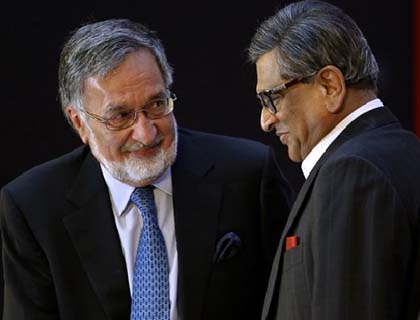Development, security and technical assistance alone is not enough: Rassoul
NEW DELHI - Roiled by terrorism, Afghanistan is not an easy destination to sell to investors but India would make all out efforts to do so, said Indian External Affairs Minister S M Krishna, inaugurating the Delhi Investment Summit on Afghanistan on Thursday.
"The holding of a major investment meet on Afghanistan when NATO forces draw down by 2014 and terrorism continues to take a toll of lives, may at first sight appear counter-intuitive. Afghanistan may not be the easiest destination to sell to an investor. But India has ventured to do so," said Krishna.
Afghanistan foreign minister Dr. Zalmay Rassoul was present at the inaugural session of the summit in New Delhi, organized by the Confederation of Indian Industry (CII), along with the governments of the two nations.
He said the decision to hold the summit is based on certain fundamental insights.
"Firstly, Afghanistan has suffered three decades of conflict and violence that have destroyed the structures of the State.
"Despite over 11 years of heightened international attention and foreign assistance, Afghanistan continues to remain a special case for development and technical assistance in years to come," he said.
"Secondly, this attention and assistance will be necessary not just for Afghanistan's good, but to our own security, that of Afghanistan, its neighbors, the region and the world at large. Let us not forget why the world returned to Afghanistan in 2001," he added.
He said development, security and technical assistance alone is not enough.
"The Bonn, Chicago and upcoming Tokyo Conferences, and the Istanbul process on regional confidence-building, demonstrate the will of the international community to remain engaged in Afghanistan. But both military interventions and foreign aid are to a large extent influenced by public opinion and prevailing economic conditions.
"We need something more enduring, something based on self-interest rather than generosity that can move the country towards greater self-reliance and inter-dependence," he said.
Rassoul said the military draw-down should not result in a political or security vacuum that will be filled by extremists once again.
"There should be something productive in its place," he said.
Rassoul said foreign investment and domestic private sector development, both small and large scale, can play a big role in Afghanistan's turnaround.
"Let the grey suits of company executives take the place of olive green or desert brown fatigues of soldiers and CEOs, the place of generals. They can also play a larger stabilizing role," said the foreign minister.
"Every investment is an investment in the future of a country and an acquisition of a stake in its security and stability together with its own citizens and investors. This will not be the security that comes from military operations but a security that comes from mutual interest and shared political commitment," he said.
"If companies invest together or in numbers, they will all benefit from the collective security of venturing together," said Krishna.
Krishna urged the investment community to act together in the interest of the collective security of Afghans and the international community.
He said India encourages its industries to venture into Afghanistan in numbers together with Afghan partners. India has relaxed customs duties for Afghanistan's exports as part of an initiative for Least Developed Countries in the SAARC, he said.
"We invite Indian and other industry to invest in Afghanistan to access the Indian market on these advantageous terms," he added.
Krishna said India visualizes Afghanistan's mineral resources, agricultural products and human resources as possible drivers of growth and regional economic development.
He said that together with the energy resources of Central Asia, Iran and the Gulf, the growing economic prowess and markets of China, Russia, Turkey and India, could knit the entire region between Turkey in the West, Russia in the north, China in the east, and the Arabian Sea and the Indian Ocean in the south, in a web of trade, transit and energy routes and economic cooperation.
Krishna called upon Confederation of Indian Industry and other Indian and regional chambers of commerce to identify obstacles to trade and investment in the region, to step up trade promotion efforts with Afghanistan and exploit the full potential of Afghanistan as a land bridge connecting various parts of Asia and Eurasia, and particularly the vast market of South Asia.
"Naturally there will be concerns of security, legal and regulatory regimes, investment protection, logistics, transport, transit, corruption, dispute resolution etc. These will have to be addressed in a spirit of partnership," he said.
"This summit may like to consider recommending a mechanism to develop a 'mutual compact' between the government and foreign investors where the interests of both Afghanistan and the international business community are protected. We look forward to this summit coming up with recommendations for the upcoming Tokyo Conference on Afghanistan," he said. (Pajhwok)

